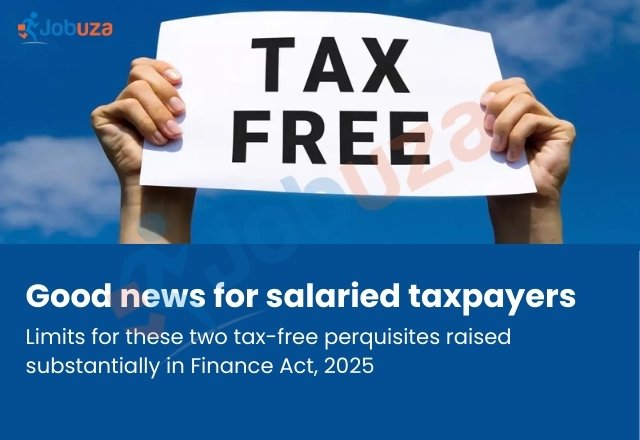Good News for Salaried Taxpayers: Finance Act 2025 Increases Tax-Free Perquisite Limits Significantly
Salaried Taxpayers: On August 18, 2025, the Central Board of Direct Taxes (CBDT) issued a notification that increased the income threshold limits for calculating tax-free perquisites in salary income. These changes were introduced through the Finance Act, 2025 and published in the India e-Gazette. The new rules will come into effect from April 1, 2025 and will apply for Assessment Year 2026-27.
Under the revised rules, the tax-free perquisite limits have been substantially increased:
-
Specified Employees: Limit raised from ₹50,000 to ₹4 lakh
-
Overseas Medical Treatment: Limit increased from ₹2 lakh to ₹8 lakh
These changes were implemented by inserting Rules 3C and 3D into the Income Tax Rules, 1962.
What Are Tax-Free Perquisites?
Perquisites are additional benefits or amenities provided by an employer apart from salary. Some of these are taxable, but certain perquisites can be tax-free if your income is below a specific threshold.
For example, benefits like:
-
Use of a company car
-
Services of a sweeper, gardener, or personal attendant
-
Supply of gas, water, or electricity
-
Free educational facilities
-
Company-provided transportation
Earlier, these were taxable for employees earning more than ₹50,000. But now, with the limit increased to ₹4 lakh, many employees will enjoy tax-free benefits.
New Limits for Specified Employees
The term “specified employee” is defined under Rule 3 of the Income Tax Rules. It includes:
-
Company directors
-
Employees holding 20% or more voting power in the company
-
Employees earning more than ₹4 lakh annually (excluding non-monetary perquisites)
Key Change:
-
If your salary income is up to ₹4 lakh, certain non-monetary benefits — such as company car, personal attendants, educational facilities, and transport — will not be taxed.
-
If your salary exceeds ₹4 lakh, these perquisites will be taxable.
-
For company directors and employees with substantial interest, these benefits remain taxable regardless of income.
Overseas Medical Treatment: Limit Increased to ₹8 Lakh
Another major change benefits employees who require overseas medical treatment:
-
If your gross total income is up to ₹8 lakh, the employer-paid medical treatment costs abroad will not be taxed.
-
If your income exceeds ₹8 lakh, these costs will be considered a taxable perquisite.
-
This also includes the travel expenses of the patient and one accompanying attendant, provided the treatment and travel are approved under RBI’s guidelines.
Earlier, this exemption was available only if your gross total income was below ₹2 lakh, but now the limit has been raised to ₹8 lakh to benefit more employees.
Impact of the New Tax-Free Perquisite Rules
These changes bring significant relief for salaried taxpayers, especially those in the middle-income group.
Example:
-
If your salary is ₹3.9 lakh and your employer provides free educational facilities for your children, you will not have to pay any tax on this benefit.
-
Earlier, the same benefit would have been taxable if your income exceeded ₹50,000.
Conditions for Claiming Tax-Free Overseas Medical Benefits
To avail of the ₹8 lakh exemption for overseas medical treatment, certain conditions apply:
-
The treatment must be for the employee or an immediate family member.
-
Travel and stay expenses are allowed for the patient and one attendant only.
-
All expenses must comply with the RBI’s approval limit, currently set at USD 250,000 per year.
Why These Changes Were Introduced
Tax experts explain that the earlier limits of ₹50,000 and ₹2 lakh were fixed decades ago and had not been revised despite rising inflation and living costs.
-
₹50,000 threshold was fixed in 2001.
-
₹2 lakh limit for overseas medical treatment was introduced in 1993.
The Finance Act, 2025 aims to align tax rules with current economic realities and provide relief to a larger number of salaried employees.
Key Takeaways
-
New rules effective from April 1, 2025 (AY 2026-27).
-
Tax-free perquisite limit for specified employees increased to ₹4 lakh.
-
Overseas medical treatment tax-free limit raised to ₹8 lakh.
-
These changes benefit employees earning below ₹4 lakh (for perks) and below ₹8 lakh (for medical expenses abroad).
-
Directors and employees with substantial interest are not exempt, irrespective of income.



